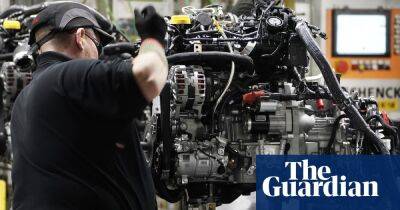‘We’ve experienced an anomaly’: Bezos’s latest Blue Origin launch fails
An uncrewed rocket belonging to Jeff Bezos’s space company, Blue Origin, failed shortly after launch in Texas on Monday morning, a potential setback for the Amazon founder’s wider ambitions of sending humans into orbit.
The malfunction of the New Shepard booster, a type of rocket that is similar to the one Blue Origin has used this year to send three crews of up to six people on suborbital flights, came 1min 4sec after launch and just as the vehicle was reaching its maximum dynamic pressure, known as “max q”.
A built-in abort system jettisoned the crew capsule away from the booster at about 5.5 miles (8.8km) altitude and deployed parachutes that dropped it back to earth. The booster is presumed to have been destroyed.
“It appears we’ve experienced an anomaly with today’s flight – this was unplanned and we do not have any details yet, but our crew capsule was able to escape successfully,” Erika Wagner, senior director of emerging space markets at Blue Origin, said during the livestream of the launch on the space company’s website.
Wagner continued: “You can see how our backup safety systems kicked in today to keep our payload safe during an off-nominal situation. Safety is our highest value at Blue Origin. It’s why we built so much redundancy into the system.”
A subsequent tweet from the company said: “This was a payload mission with no astronauts on board. The capsule escape system functioned as designed.”
Independent experts on Twitter said they suspected a propulsion system failure was the cause of the malfunction.
The mission, called NS-23, was carrying “36 payloads from academia, research institutions and students across the globe” on this particular vehicle’s ninth overall flight, Blue Origin said.
The company believes two
Read more on theguardian.com
 theguardian.com
theguardian.com














![Bitcoin [BTC] holders anticipating a bear market floor should read this - ambcrypto.com](https://finance-news.co/storage/thumbs_400/img/2022/10/12/44503_wur1.jpg)

